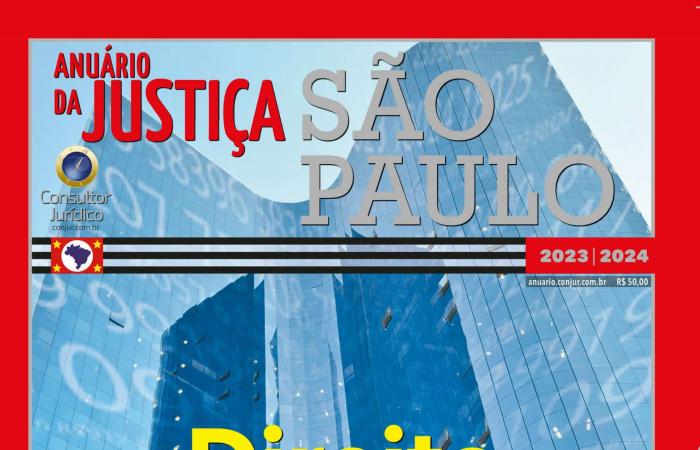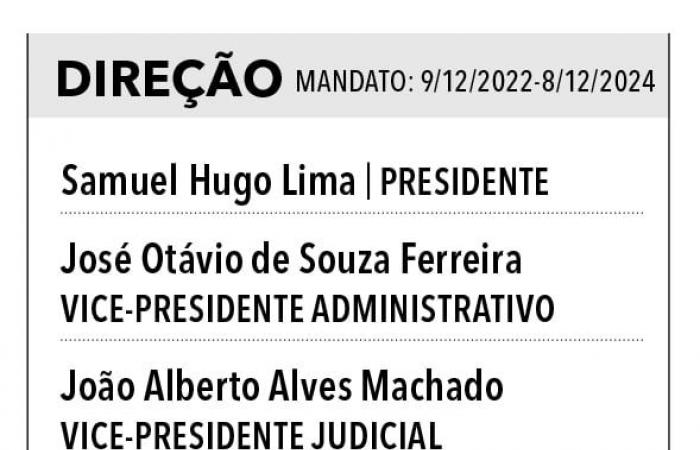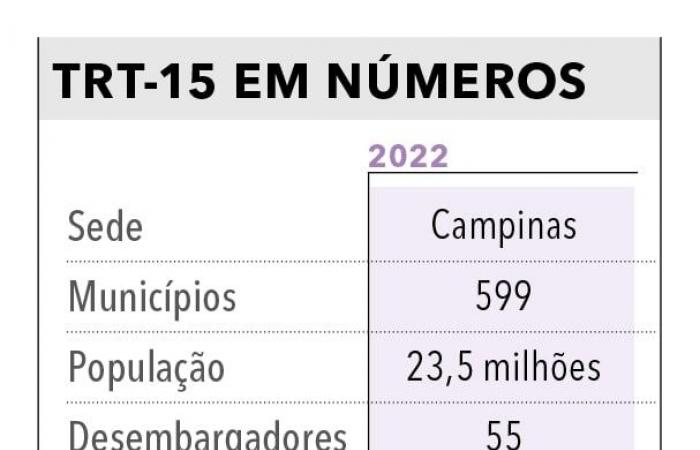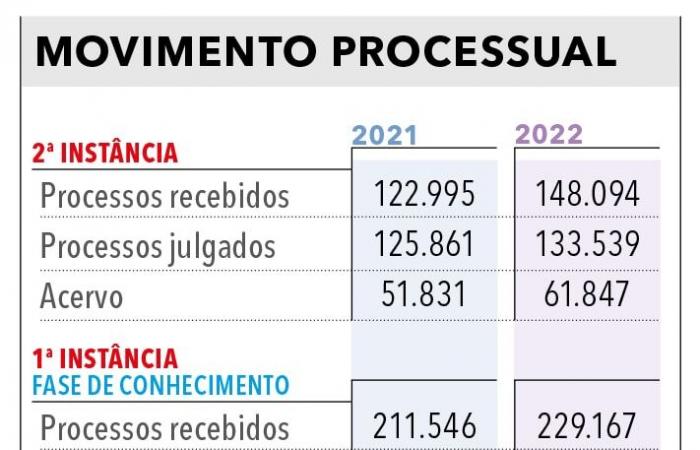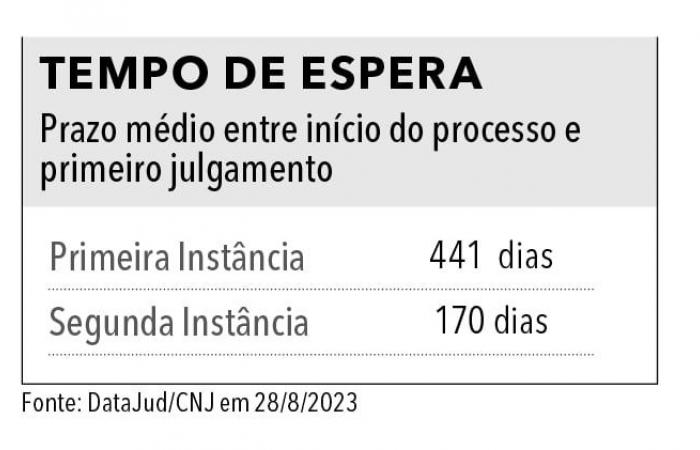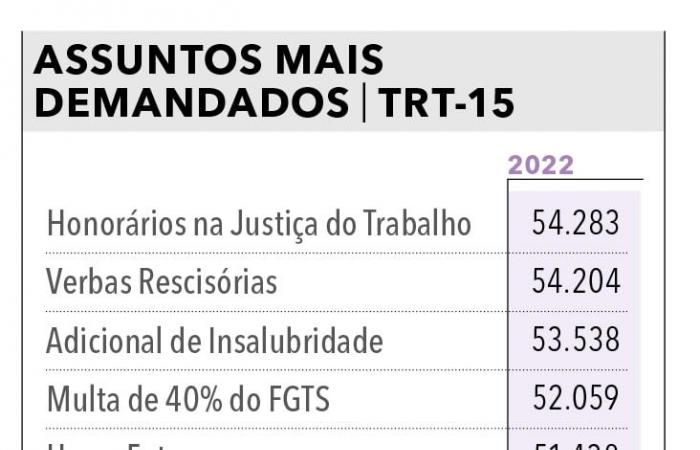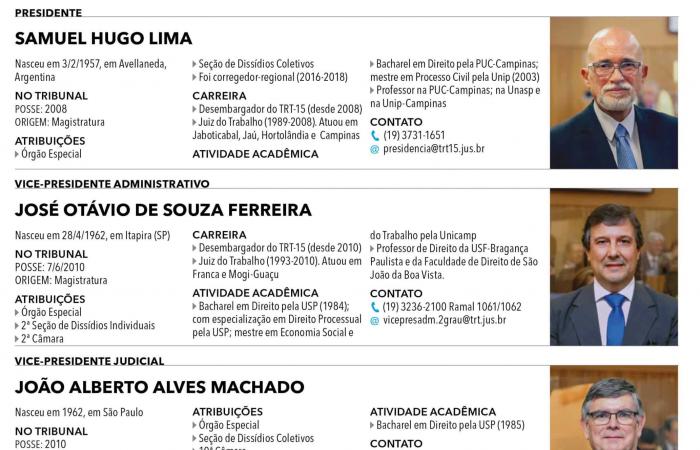*Report published in São Paulo Justice Yearbook 2024, released this Monday (18/3). The digital version is free, access it on the Justice Yearbook website (click here to read). The printed version is on sale at Livraria ConJur (click here).
São Paulo Justice Yearbook was launched last week
The Labor Court is faced with the challenge of understanding the questions and applying innovative theses about new forms of work and employment relationships. While experiencing this conceptual transition, it continues to deal with the old demands that continue at a steady pace. As the president of TRT-15, judge Samuel Hugo Lima, recalls, the most recurring cases in court are basic issues such as the payment of overtime and other demands present in the termination of the employment contract, in addition to situations that should have already been banned from society. , such as causes relating to work in conditions similar to slavery or child labor.
The court ordered the construction company Viasol and the Companhia de Desenvolvimento Habitacional e Urbano do Estado de São Paulo (CDHU) to pay compensation for collective moral damage in the amount of R$200,000, when judging a collective action that investigated allegations of work analogous to slavery. He reported that the company did not comply with payments, nor did it guarantee rights related to the working conditions and accommodation of its employees. It even prohibited workers from returning to their home states. The matter is still under appeal at the Superior Labor Court.
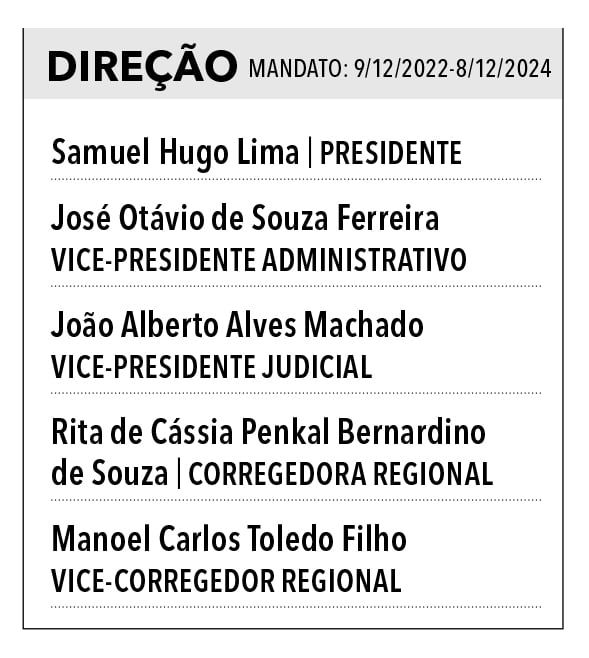
The court also deals with actions filed at the height of the health crisis resulting from the covid-19 epidemic in 2020. “The pandemic has placed health care and the work environment at the center of discussions in the last three years. We received many demands related to the health crisis, which accelerated the process of transforming work through the use of new technologies”, says Lima.
In this context, TRT-15 analyzed cases of workers who contracted the disease, even if it was not in a hospital environment. Based on a precedent established by the Federal Supreme Court, the court considered the case of a nurse from a company contaminated by the virus during work as an occupational disease. Compensation of R$ 10,000 was set for moral damages due to illness and consequences resulting from Covid-19, in addition to compensation for material damages for expenses proven in the process of treating the illness. The company appealed the decision to the TST.
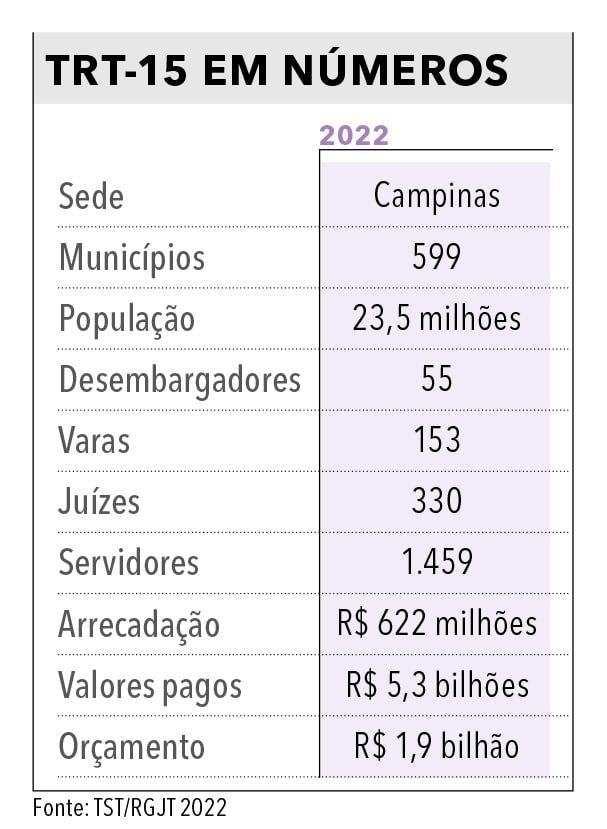
The gradual return to normality of work with the easing of the crisis caused by Covid-19 had a negative impact in the second instance. From 2021 to 2022, the volume of new cases in court grew by 20%. Even judging 6% more cases in 2022, the judges were unable to prevent the collection of pending cases from growing by 19%. In the first instance, the collection decreased by a notable 10%, thanks to less demand pressure and a more productive response from judges. “Judges and labor court employees resolved 14% more conflicts in 2022 compared to the previous year. We closed with 192 thousand cases pending resolution in the knowledge phase”, reports Lima.
In the ranking of matters that reached the TRT-15 in 2022, demands related to fees in the Labor Court stand out with 54,283 records, followed closely by severance pay, with 54,204.
During the pandemic period, some courts in the interior had such a significant drop in cases that they were almost closed in 2022. The extinction is provided for in Resolution 296/2021 of the Superior Council of Labor Justice for courts that have a procedural distribution of less than 50 % of the average number of new cases in the respective court in the last three years. However, the São Paulo section of the OAB asked to consider the fact that the entry of new processes was hampered by isolation. With this in mind, some adjustments were made. Thus, the Rancharia Labor Court, which had little procedural movement, was abolished and the 5th unit was created in Jundiaí, which has one of the busiest forums in the interior.
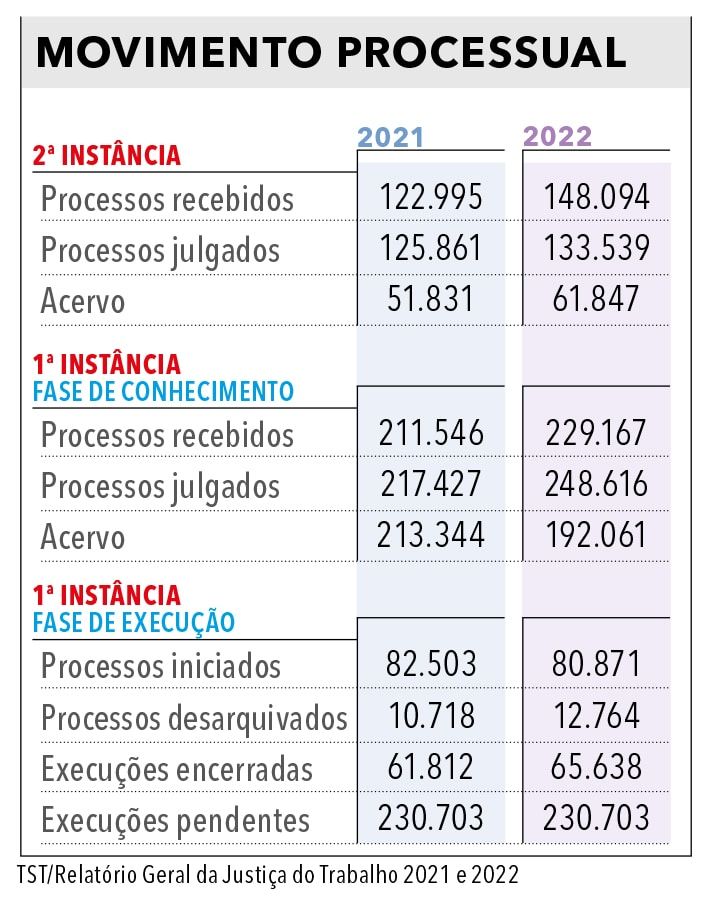
According to the 2022 General Labor Court Report, published by the TST, 248 thousand cases were processed through the courts of the 15th Region that year. Of this total, 93 thousand (37%) ended in conciliation. Of the 133 thousand cases (53%) that were judged on the merits, 106 thousand (80%) were considered fully or partially valid, that is, at some point they were favorable to the workers. The bosses prevailed in 27 thousand cases (20%). 22 thousand cases (10%) were not judged on the merits.
The execution phase continues to be an insurmountable bottleneck for the 15th Region, as it is not only for the entire Labor Court but for Brazilian Justice in general. Among new processes and processes that were reopened, 93 thousand execution cases were processed in the courts of the 15th Region, but only 65 thousand were closed.
The president argues that the court, however, knows how to act creatively to make the wheels turn. “Each of the 55 TRT-15 judges judged, with the help of summoned judges and civil servants, more than 2,400 cases in 2022”, assesses Lima. He also celebrates the fact that of every 100 cases resolved in 2022, 37 were closed with agreements between the parties. “In the last four years we have achieved what was established by goal 3 of the National Justice Council [Meta 3: Aumentar o índice de conciliação em relação à média do biênio 2019/2020, em 1 ponto percentual. Cláusula de barreira: 40%]. The 15th has magistrates and civil servants extremely engaged in the art of conciliation, which represents one of the structuring bases of the Labor Court. Through constructive dialogue, the parties seek to resolve the dispute in the most beneficial way for both, without the need to resort to a judicial solution”, assesses the president.
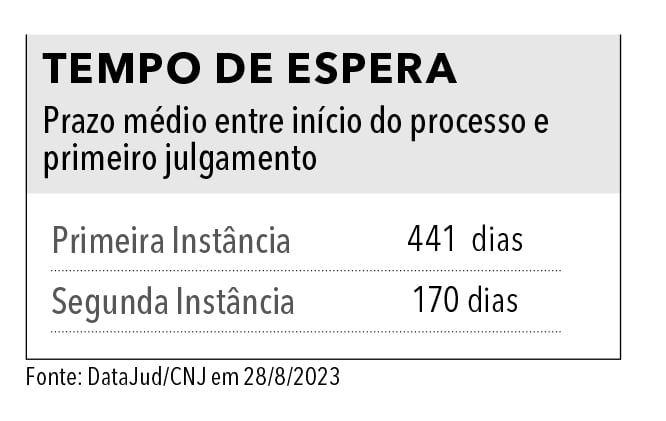
The court carries out several activities to promote conciliation. One of them is an itinerant project coordinated by the vice-presidency called “Reconciling is Working Hand in Hand”. “It takes the Labor Judiciary to the geographic focus of the most recurring conflicts within the magazine appeals sector”, explains Lima. Divided into two stages, the project consists of promoting strategic meetings in the main cities in the interior of São Paulo to spread the culture of conciliation and, subsequently, holding hearings. According to the court, the agreement rate in these events is above 50%.
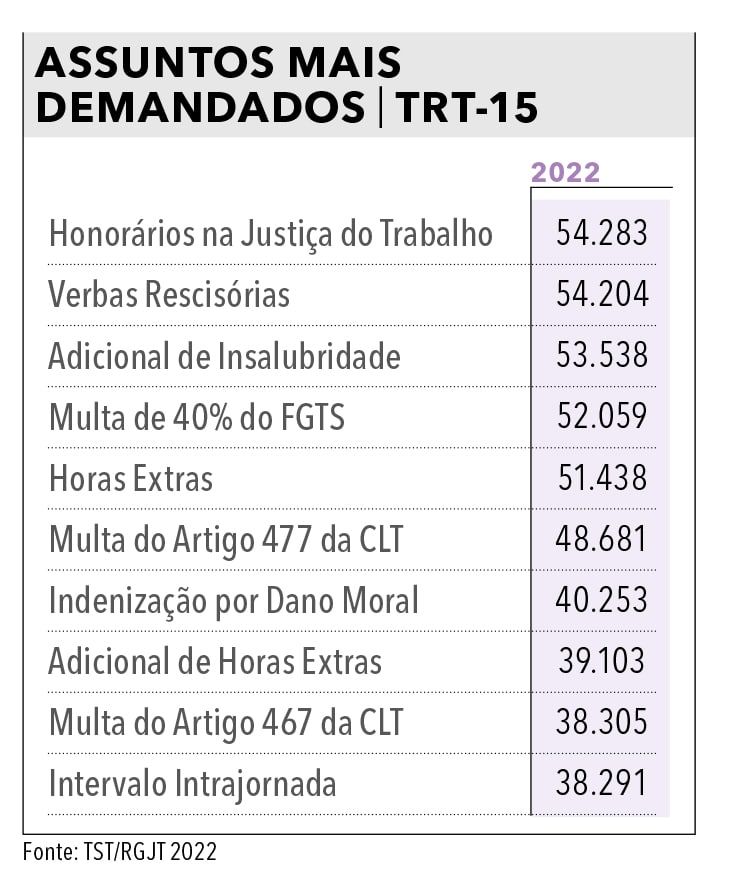
During this period, one of the actions that TRT-15 highlights was resolved at Cejusc (Judicial Center for Consensual Methods of Dispute Resolution) in Taubaté. In March, an agreement signed between the Metalworkers Union of Taubaté and Region and Volkswagen do Brasil worth R$8.8 million was approved in a televised hearing. Of this amount, R$7.7 million goes to 11 workers who will receive amounts due as hazard pay and its consequences, in addition to FGTS differences.
The values approved through Conciliation in 2022 exceeded R$2.7 billion. According to the president, the TRT-15 was the court that guaranteed the largest sum of amounts paid to workers who approached the Judiciary seeking redress for any labor rights violated in 2022.
“From January to December, there were R$5.34 billion, almost 15% of the R$38.79 billion allocated by the 24 TRTs, according to data from the Superior Labor Court. In second and third place appear the TRTs from the 2nd (SP) and 1st (RJ) Regions, with R$5.25 billion and R$4.82 billion”.
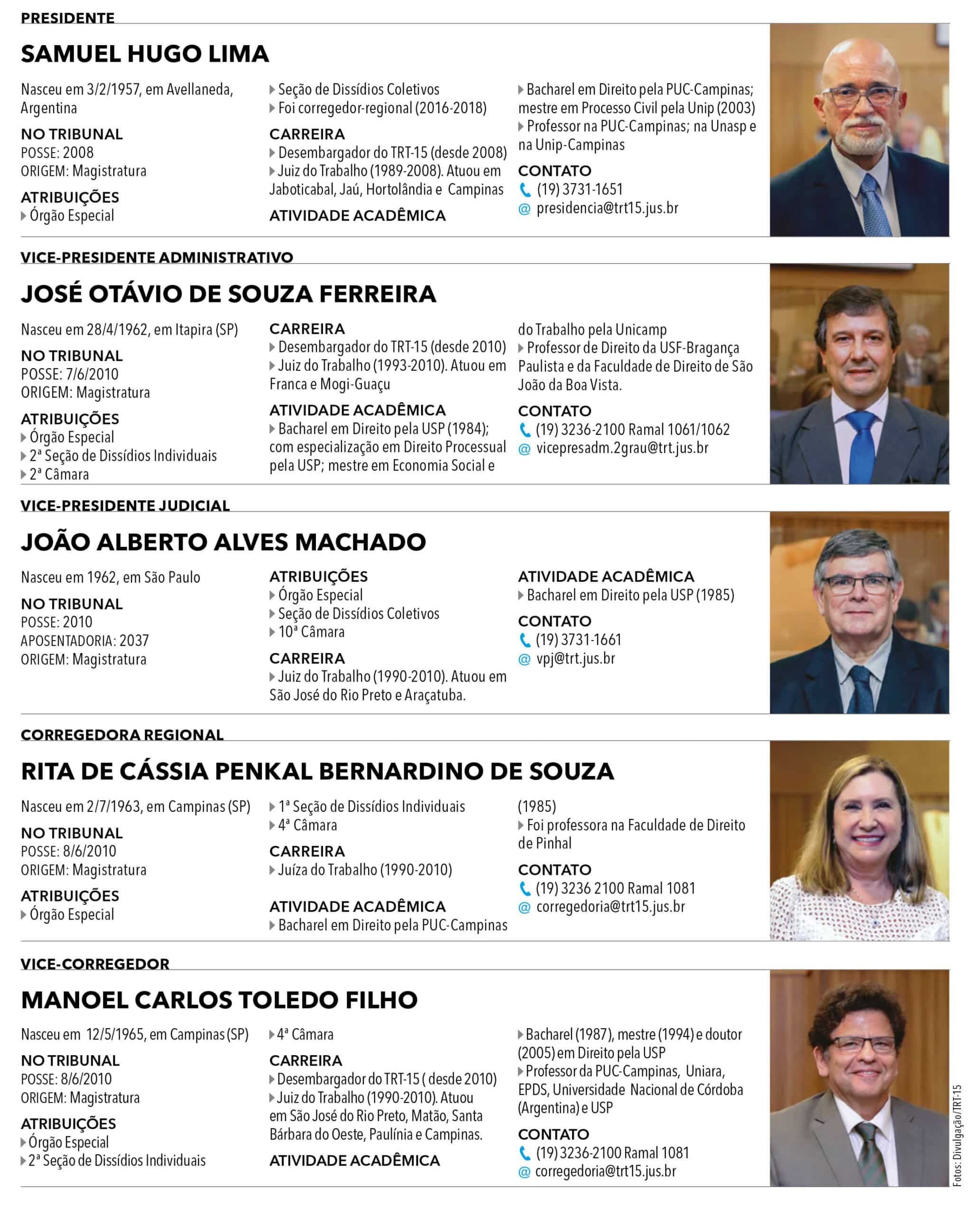
SÃO PAULO JUSTICE YEARBOOK 2023 | 2024
13th Edition
ISSN: 2179244-5
Number of pages: 332
Printed version: R$50, pre-sale at Livraria ConJur
Digital version: available free of charge, from March 18, 2024, on the “Anuário da Justiça” app or on the website anuario.conjur.com.br
Announced in this edition:
Abreu Sampaio Law Firm
Adilson Macabu and Nelson Pinto Law Firm
Law Firm Rubens Ferreira and Vladimir Oliveira da Silveira
Antonio de Pádua Soubhie Nogueira Advocacia
Apamagis – São Paulo Association of Magistrates
Areosa, Martins, Tavares Advogados
Arruma Alvim & Thereza Alvim Law and Legal Consulting
Ayres Britto Legal Consulting and Advocacy
Basilio Lawyers
Bialski Associate Lawyers
Bottini & Tamasauskas Lawyers
Caselli Guimarães Advogados
Cesa – Center for the Study of Law Firms
D’Urso & Borges Advogados Associados
Décio Freire Advogados
Dias de Souza Lawyers
Fernando José da Costa Advogados
Fidalgo Lawyers
Sources Tarso Ribeiro Advogados Associados
Fux Lawyers
Guimarães Bastos Lawyers
Heleno Torres Lawyers
Hesketh Lawyers
JBS SA
Laspro Consultants
Leite, Tosto e Barros Advogados
Lemos Jorge Advogados Associados
Lollato, Lopes Rangel, Ribeiro Advogados
Machado Meyer Lawyers
Marsaioli & Marsaioli Associated Lawyers
Martins, Franco and Teixeira Law Firm
Mesquita Ribeiro Advogados
Milare Lawyers
Moraes Pitombo Advogados
Multiplan
Oliveira Alves Lawyers
Oliveira Lima & Dall’Acqua Advogados
PX Judicial Assets
Pardo Advogados & Associados
PMA – Penna Marinho Advogados
Regis de Oliveira, Corigliano and Beneti Advogados Associados
RMS Advogados – Rocha, Marinho and Sales
Sergio Bermudes Lawyers
Thomaz Bastos, Waisberg, Kurzweil Advogados
Tojal Renault Advogados
Warde Lawyers
Zanetti e Paes de Barros Advogados

